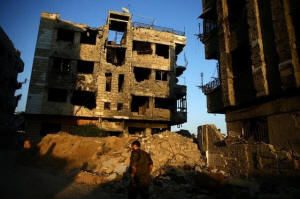|
Syria rebels guardedly agree on truce but
battles persist
 Send a link to a friend
Send a link to a friend
 [September 12, 2016]
By Angus McDowall and Tom Perry [September 12, 2016]
By Angus McDowall and Tom Perry
BEIRUT (Reuters) - Government troops and
insurgents fought in several parts of Syria on Sunday, apparently
seeking to strengthen their positions on the eve of a ceasefire that
Free Syrian Army rebels said they would observe but with major
reservations.
The Free Syrian Army groups wrote to the United States on Sunday about
the deal it agreed on with Russia, saying that while they would
"cooperate positively" with the ceasefire, they were concerned it would
benefit the government.
Although the letter did not explicitly say the groups would abide by the
ceasefire, two rebels who confirmed its text to Reuters said they would
respect the ceasefire when it comes into force on Monday evening.
But according to the letter, the groups are worried by the absence of
enforcement mechanisms, a lack of provision for besieged areas and
clauses letting army jets fly for up to nine days after the deal comes
into effect.
The influential hardline Islamist rebel group Ahrar al-Sham issued a
statement late on Sunday attacking the ceasefire deal, but stopping
short of explicitly saying it would not abide by its terms.
A war monitor reported clashes around Aleppo and Damascus, but pushes by
the government in the mountainous northwest and rebels in the southwest
indicated an effort to improve their positions before fighting is due to
stop on Monday.

Syria's five-year civil war has killed hundreds of thousands of people
and displaced 11 million - half the country's prewar population -
causing a refugee crisis in the Middle East and Europe and inspiring
jihadist attacks around the world.
Underscoring the war's global impact, President Bashar al-Assad is
backed by Russia's air force, Iran's Revolutionary Guards and Shi'ite
militias from Iraq and Lebanon, while the rebels are supported by the
United States, Turkey and Gulf Arab states.
Previous peace agreements crumbled within weeks, with the United States
accusing Assad and his allies of attacking opposition groups and
civilians. On Saturday, air strikes on rebel-held areas killed scores of
people.
"A big part of the agreement serves the regime and doesn't apply
pressure on it and doesn't serve the Syrian people," said Zakaria
Malahifji of the Aleppo-based rebel group Fastaqim.
Syria's government has not issued an official comment on the truce, but
Syrian state media on Saturday quoted what it called private sources as
saying the government had given its approval. Iran welcomed the deal on
Sunday.
ISLAMIC STATE EXCLUDED
The ceasefire will not apply to the jihadist groups Islamic State or
Jabhat Fateh al-Sham, known as the Nusra Front until it broke formal
allegiance to al Qaeda and changed its name.
The rebel groups writing to the United States said the exclusion of
Jabhat Fateh al-Sham, which operates only inside Syria, while including
Iran-backed foreign Shi'ite militias that operate across international
borders showed a double standard.
They added in their letter that its exclusion from the ceasefire would
be used by Russia as a pretext to bomb other rebel groups, citing their
experience of a failed cessation of hostilities earlier this year.
[to top of second column] |

A fighter from the Free Syrian Army's Al Rahman legion walks past
damaged buildings in the rebel held Jobar, a suburb of Damascus,
Syria September 6, 2016. Picture taken September 6, 2016.
REUTERS/Bassam Khabieh

The Syrian air force bombed Islamic State targets near Palmyra,
state television reported on Sunday, while rebels clashed with the
group northeast of Damascus, the Syrian Observatory for Human
Rights, a U.K.-based war monitor said.
The United States warned insurgents on Saturday they would face
"dire consequences" if they cooperated with Jabhet Fateh al-Sham,
which fought alongside a range of mainstream and Islamist rebel
groups during intense battles in recent weeks in southern Aleppo.
Ahrar al-Sham, one of the largest Islamist groups among the rebels,
which has fought alongside Jabhat Fateh al-Sham, criticized the deal
in a videotaped speech celebrating Islam's Eid al-Adha festival,
which falls on Monday, without rejecting it outright.
It said the deal failed to meet the minimum goals of the movement
and would increase the suffering of the Syrian people. It also
attacked what it called the "singling out" of particular groups,
apparently a reference to the exclusion of Jabhat Fateh al-Sham.
Illustrating how widely insurgents work with the former al Qaeda
affiliate, Ahrar al-Sham was one of several rebel groups to announce
the launch of an offensive in the southwest in coordination with
Jabhat Fateh al-Sham on Saturday.
Insurgents posted footage said to show battles on that front on
Sunday which Reuters could not verify.
In Latakia province, violent clashes continued on Sunday two days
after the army and its allies launched an offensive around several
villages near the main coast road to Aleppo using heavy artillery
fire and dozens of air strikes, the Observatory said.

More air strikes were reported in Aleppo and Idlib province on
Sunday after scores of people were killed in aerial bombardment on
Saturday. One in the town of Saraqeb hit a civil defense center
where civilian rescuers are based, injuring several, according to
the Observatory.
(Reporting by Tom Perry and Angus McDowall; Editing by Ruth
Pitchford and Peter Cooney)
[© 2016 Thomson Reuters. All rights
reserved.]
Copyright 2016 Reuters. All rights reserved. This material may not be published,
broadcast, rewritten or redistributed. |